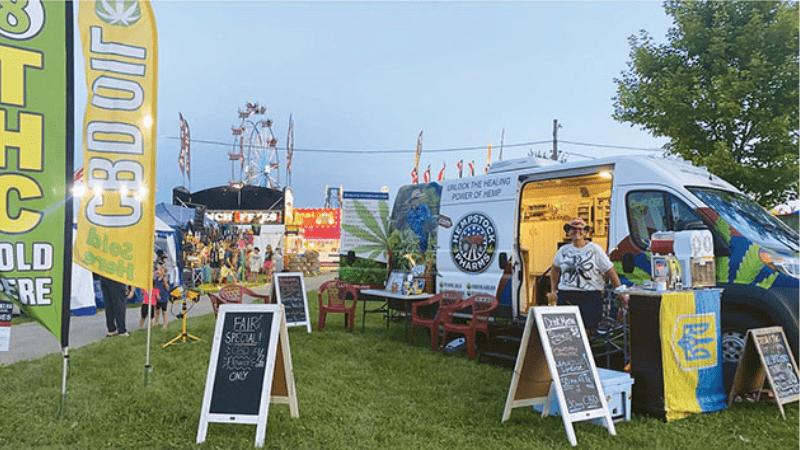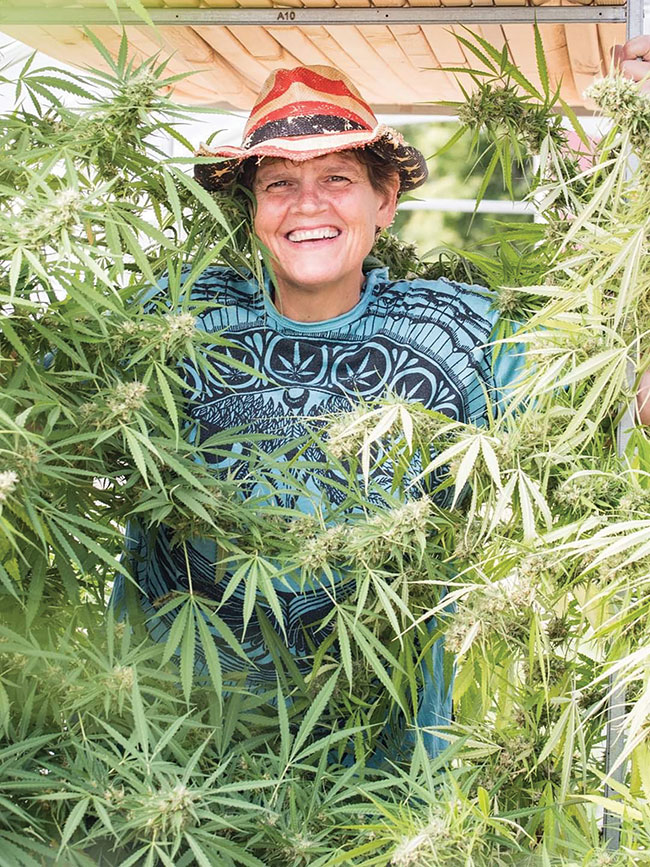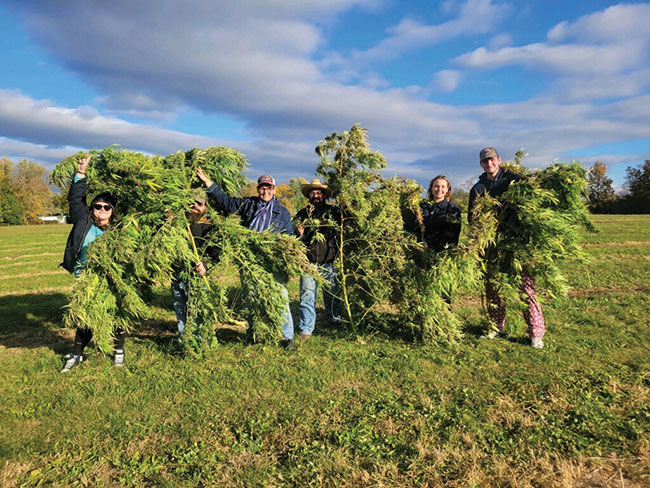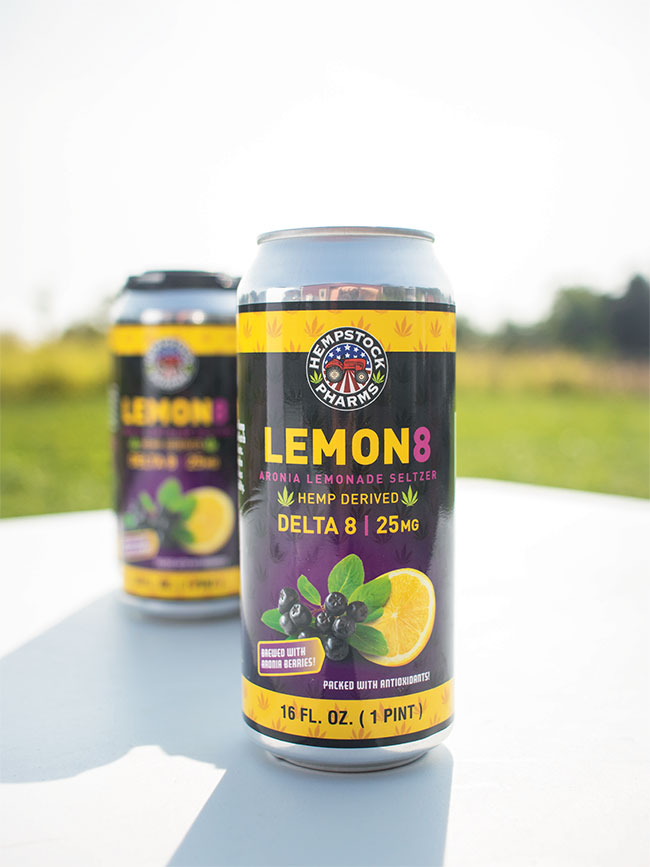
Finding your position in the hemp industry
Five years ago, Stacy McCaskill was a Small Business Development Center (SBDC) director at a local, ag-focused community college in Illinois when hemp really started to enter the conversation. Working with Rachel Berry, founder of the Illinois Hemp Growers Association, McCaskill quickly became a hemp industry leader in the state.
Together, they began rolling out training sessions for farmers who were interested in exploring hemp, seeing what the economic opportunity might be and analyzing risk versus reward in this emerging market.
When McCaskill and her wife saw (and quickly purchased) a 13-acre property in Woodstock, Illinois, in May 2019, McCaskill found herself taking her own advice. Hempstock Pharms was born as a seed-to-label hemp farm growing for cannabidiol (CBD) oil.

Following her counsel
McCaskill leaned on her own research and work with other farmers to dive headfirst into the hemp market. Much of the information directing Hempstock Pharms is the same advice she would offer other farmers today.
With the infrastructure complexities of farming for seed and the supply chain challenges of fiber farming, McCaskill says, “The only real option if people wanted to play around with hemp to see if they could diversify their income source on their farm was to go for cannabinoid hemp farming.”
Even CBD hemp farming, however, is not without its challenges.
“Guys were basically just running spreadsheets, thinking, ‘If I grow 5 acres, I can make this much. If I grow 500 acres, I could make that much,’ and they were getting a little spreadsheet happy,” McCaskill says. “They were being quoted current market prices of hemp biomass, which have been diving constantly since 2019.”
Banking laws are also not aligned with ag laws, making banking and credit card processing very difficult. Therefore, McCaskill advises not to get into hemp under your same farm, but instead create a separate business with a separate purpose.
“If you’re going to go for hemp, if you’re going to go for cannabinoid hemp, CBD hemp, buyer beware,” she says. “Let it be a calling, let it be a passion. Those are the guys I think will be around in the long run.”
 Creating Hempstock Pharms
Creating Hempstock Pharms
This calling has led to the success of the consistently expanding Hempstock Pharms. McCaskill, who calls herself a marketer and not a farmer by trade, grows hemp from seed organically on 4 acres and has crafted more than 55 products for sale.
“For Hempstock Pharms, the reason we did seed to label was I felt like I didn’t know how to find and secure a CBD contract, and I didn’t have the property for it,” McCaskill says. “Also, CBD should be local just like food is local; I’m a big believer that food is medicine and local food is better food for your body.
“If you’re buying from a national brand then the CBD that you’re getting is consolidated nationally, maybe even globally. And so you really have no idea where your CBD is coming from.”
Hempstock Pharms has been a part of University of Illinois studies on different cannabis strains across the state to figure out which strains grow better in which regions. These studies have shown differences in cannabinoid profiles depending on soil and water.
“Marijuana is just like wine,” McCaskill says. “I could grow the exact same strain as the guy that’s growing down the street, and we’re going to have different cannabinoid profiles from our plant.”
For this reason, she recommends consumers find different local hemp farmers and keep trying products until they find one that works.
When Hempstock Pharms began in 2019, McCaskill went to Wisconsin (close to her location in northern Illinois) to see what strains might grow well in the region, instead of relying on more established vendors of hemp feminized seed from Oregon and California.
McCaskill tested a bunch of strains the first couple years, but now because of cost factors and testing becoming stricter and more complicated, she says they’ve dialed back to doing one strain a year.
“We basically rotate and try a different strain every year so that we can add a new lineup to our smokable flower line, and then also play around and see what other cannabinoid combinations we can get,” McCaskill says. “When we send our biomass in, we just check the cannabinoid profile and make sure it’s relatively close to the profiles that we’ve had in previous years for addition to some of our key products.”
She also has a bank of special cannabinoids that are specific to some products, enough for another five or six years of demand.
A part of the community
Hempstock Pharms is an agricultural-zoned property only a mile and a half from the town center and, with that, McCaskill has made community involvement paramount to the business’ success.
Aside from starting seedlings in hoop houses, all growing occurs outdoors, meaning one harvest per year that takes harvesting by hand to a different level.
“We do an annual community harvest; we do not pay people to harvest our hemp,” McCaskill says. “We feel community harvest is incredibly important to give that experience to our local community, and it’s a huge, fun, big party once a year.”
Hempstock Pharms also does community trim parties throughout the winter. McCaskill and her team throw on some pots of soup and provide drinks and snacks, and customers come out and help trim and process the product.

This customer-centric philosophy is one of the most important ways small-scale hemp farms can set themselves apart from larger operations, according to McCaskill.
“We feel that every customer that we add, we want to have met them personally, have talked to them, have heard their story and have made recommendations that are custom to the problems that they’re trying to solve,” she says. “The feedback that I get from most people is that when they go to the medical marijuana or to recreational marijuana dispensaries, they feel it’s like a methadone clinic.”
Looking forward
Although Hempstock Pharms has an online presence, it’s intentionally more as a convenience for current customers than to capture any new business.
“Every new product that we do has been from either a personal necessity or from a customer coming to us and asking for something,” McCaskill says.
Hempstock Pharms is primarily focused on strategic growth now. It has seen a rebound in interest for smokable flower and is also leaning into the ever-popular drink market, specifically with its Lemon8, which has 25 milligrams of Delta-8 THC.
This expansion doesn’t come without its challenges, though, with CBD considered a drug federally, and therefore not allowed in any food or drinks nationwide. Some states such as Florida, however, allow hemp-derived cannabinoids to be added to food if you have the correct permits.
“Everybody thinks that if they hire a lawyer, if they sit down and read the law, they’re going to figure out what’s wrong and what’s right, and there’s no figuring it out,” McCaskill says. “There’s so much that has yet to be legislated and decided, so there is tremendous risk in this industry if you are doing anything other than basically CBD topical.”
Sidebar: Building a diverse customer base
A marketer at heart, Stacy McCaskill has created a strong brand to really help her farm succeed.
“My whole thing, my whole strategy for marketing, is to find the most weird, different environments,” she says. “We try to find communities that we haven’t been to before and that don’t look like us.”
Recently, Hempstock Pharms started attending bridal expos and has since booked more than 15 wedding packages.
“They’re hiring us to come be cannabud tenders and do drinks and flower bars at their wedding,” McCaskill explains. “We’ll make canna-cocktails, different kinds of cannabinoid-infused drinks. We do bouquets; we do table arrangements. We can do smokable flower arrangements, centerpieces that can go home with people and then they can smoke them when they take them home.”
Hempstock Pharms tries to book an expo, county fair or festival (shown above) at least 40 to 45 weeks out of the year, and only approximately 15 of these are legacy events that they go to every year.
The farm’s location approximately 60 miles outside of Chicago offers a lot of possibilities, as does McCaskill’s background. She used to be a diversity trainer, has an international master’s business degree, used to live in China, speaks Chinese and spent some time teaching in Ukraine.
“With all of that international background, I’m bringing that to our very Americana, homegrown Hempstock Pharms and helping it have a very global outreach,” McCaskill says. “It’s neat to see the diversity of our customer base because we’ve been so incredibly intentional about building a diverse customer base.”
For an enhanced reading experience, view this article in our digital edition by clicking here.



